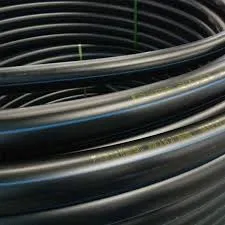Aug . 14, 2024 23:23 Back to list
High Density Polyethylene Pipe Solutions for Reliable and Durable Plumbing Applications in Various Industries
Understanding Solid HDPE Pipe Applications and Benefits
High-Density Polyethylene (HDPE) pipes have revolutionized various industries, offering an efficient, durable, and environmentally friendly solution for piping needs. Solid HDPE pipes, in particular, are celebrated for their structural integrity and versatility. In this article, we will explore the properties, applications, and advantages of solid HDPE pipes, highlighting why they are an increasingly preferred choice in modern infrastructure.
What is Solid HDPE Pipe?
Solid HDPE pipes are cylindrical tubes made from high-density polyethylene, a thermoplastic polymer known for its high strength-to-density ratio. The solid design ensures a continuous flow of liquids and gases, making these pipes ideal for various applications. Unlike corrugated or perforated pipes, solid HDPE pipes maintain a consistent wall thickness throughout, providing enhanced pressure resistance and longevity.
Properties of Solid HDPE Pipes
1. Durability HDPE possesses excellent resistance to chemicals, abrasion, and impact. This durability makes solid HDPE pipes suitable for harsh environments, where traditional materials might fail.
2. Flexibility Despite being solid, HDPE pipes are flexible enough to withstand pressure changes and ground movements. This adaptability reduces the risk of breakage due to environmental factors.
3. Lightweight Solid HDPE pipes are significantly lighter than traditional piping materials like steel or concrete. This lightweight characteristic simplifies transportation and installation, resulting in lower labor costs.
4. Corrosion Resistance Unlike metal pipes, solid HDPE pipes do not rust, ensuring a longer lifespan with minimal maintenance.
5. Low Friction Coefficient The smooth interior surface of solid HDPE pipes reduces friction, allowing for efficient flow rates and decreased energy consumption in pumping systems.
Applications of Solid HDPE Pipes
Solid HDPE pipes are utilized across various sectors
solid hdpe pipe

1. Water Supply With their excellent resistance to corrosion and chemicals, solid HDPE pipes are widely used in municipal water supply systems, providing a reliable means of transporting drinking water.
2. Sewage and Wastewater Systems Their durability and flexibility make solid HDPE pipes ideal for sewage and wastewater management, helping to prevent leaks and ensuring safe waste disposal.
3. Agricultural Irrigation Farmers rely on solid HDPE pipes for efficient irrigation systems. The pipes' ability to handle varying pressure levels makes them suitable for transporting water across varying terrains.
4. Telecommunications Solid HDPE pipes are also used in the telecommunications industry to protect fiber optic cables and other sensitive lines from external damage.
5. Industrial Applications Many industries, including chemical manufacturing and food processing, employ solid HDPE pipes for their robustness and resistance to a wide range of chemicals.
Advantages of Solid HDPE Pipes
The adoption of solid HDPE pipes comes with numerous benefits
- Cost-Effectiveness Although the initial investment may be higher than traditional materials, the long lifespan, reduced maintenance, and lower energy costs associated with solid HDPE pipes lead to significant savings over time.
- Environmental Impact HDPE is recyclable, contributing to a smaller environmental footprint compared to other materials. Using solid HDPE pipes helps in promoting sustainable practices in infrastructure development.
- Ease of Installation The lightweight nature and flexibility of solid HDPE pipes make them easier to install. They can be installed using various techniques, including trenchless technology, minimizing disruption to existing services and landscapes.
Conclusion
Solid HDPE pipes represent a modern solution to various piping challenges faced by industries today. Their remarkable properties—durability, flexibility, and resistance to various environmental factors—make them a preferred choice for water supply, sewage systems, agricultural applications, and beyond. As industries continue to seek sustainable and cost-effective solutions, the role of solid HDPE pipes is set to expand, ensuring a reliable infrastructure for future generations.
-
High-Quality PPR Pipes and Fittings Durable ERA PPR & PVC PPR Solutions
NewsJul.08,2025
-
Black HDPE Cutting Board - Durable, Non-Porous & Food Safe HDPE Plastic Cutting Board
NewsJul.08,2025
-
High-Quality CPVC Panel Durable HDPE & PVC Panels Supplier
NewsJul.08,2025
-
Double PE Welding Rod Supplier - High Strength, Durable & Versatile Welding Solutions
NewsJul.07,2025
-
High-Quality PVC-O Pipe Supplier Durable 75mm PVC Pipe & Connections Leading PVC Pipe Company
NewsJul.07,2025
-
HDPE Drainage Pipe Supplier – Durable & Corrosion-Resistant Solutions
NewsJul.06,2025

